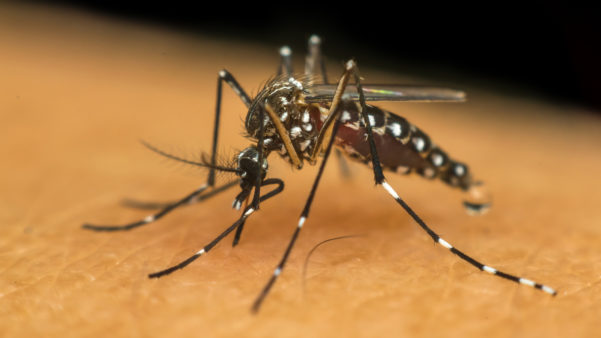
Oct 9, 2018 | Pest Control
The Atlantic Hurricane season starts in June and runs through the end of November. The damage of Florence has been felt throughout the southeastern United States and preparations for more potential storms have begun. The rising water and downed trees force pests to seek out shelter, and that often means your home. Here are a few steps you can take to prevent pests from taking refuge in your home during hurricane season:
Invest in Gutter Protection
Take Steps before the Storm Hits
After the Storm
- Once the storm passes, if your area experiences widespread power outages, you may have the unfortunate luck of dealing with spoiled food. This can attract flies, rodents, and many other pests. Store trash of this nature as far away from the home as possible to cut down on infestations.
- Looking for any structural damage from water is key as termites will be attracted to the slowly rotting wood. Look to remove and replace any damage done.
- External damage to the home presents an entrance for wildlife to enter homes for shelter. Look to repairing any of these external issues as quickly as possible.
You and your family’s safety are the number one concern. Consider scheduling a home inspector to come out and look for any other issues you should address in and around your home. Once that’s done, call your local, licensed pest control professional to perform an inspection that could help keep your family safe from pests.

Sep 28, 2018 | Mosquito, Pest Control
Summer is drawing to a close and, even though the temperatures are cooling off, they haven’t reached the cold level yet. The time is drawing near for the last battle of the year – us versus mosquitoes! That’s right – just because we’ve moved into fall doesn’t mean the end of mosquito season – especially in the south. Mosquitoes are cold-blooded insects and won’t disappear until temperatures are consistently below 50 degrees. In fact, mosquitoes can even still breed in standing water, especially with the extra rain this time of year brings.
So what can you do to not only prepare yourself for this last battle but keep them at bay until the winter months? Make sure to include mosquito prevention in your fall home and yard preparations. Follow these tips to win the battle with mosquitoes!
- Remove any standing water from flower pots, bird baths, tires, tarps, and any other containers in and around your yard that can hold stagnant water.
- Remove piles of leaves and debris from your yard as these can give mosquitoes a place to hide out and possibly breed.
- Clean your gutters and fix leaky pipes. If cleaning gutters isn’t your thing, consider installing gutter guards to eliminate the hassle of cleaning them year after year.
- Continue to wear protective clothing and repellent when you are outdoors, especially in the early morning and at dusk.
- Make sure screens on doors and windows are in good repair without holes or tears, especially as we use our air conditioners less and enjoy the cooler temperatures outdoors.
- Contact a professional pest control company to help you eliminate mosquitoes from your home and property and help you with an ongoing prevention and treatment plan.

Aug 23, 2018 | Pest Control
Fall is the perfect time of year to prepare your home for winter. While prepping your yard and storing away your summer things are usually at the top of the list, don’t forget to protect your home from pests this winter also! Fall is prime time for pests to make their way into your house in search of food, shelter, and warmth over the cold winter months.
Rodents will make their way indoors in search of a warm place to shelter for winter. Flies will often be found on the south and west facing walls of your home in search heat. Many stinging insects like yellow jackets, bees, and wasps will become more hostile in the fall as their food supply dwindles. Cockroaches are attracted by the moisture found in and under your home. Other pests like ants, stinkbugs, ladybugs, and box elders will come inside looking for a place to overwinter.
Now that you know what kinds of pests to expect this fall, what can you do to protect your home from these often unseen invaders? Check out these 6 tips to prevent pests this fall.
- Keep Them Out. Inspect the inside and outside of your home for possible entry points that pests can use. Seal any cracks and crevices on the outside of your home with caulk and steel wool, especially around utility pipes. Screen your attic vents and install chimney sweeps. Screen any other openings to the outdoors like mail slots and pet doors. Repair loose mortar around your foundation and windows. Check screens for holes and repair or replace them as needed. Check for any gaps around doors and windows. Install or replace weatherstripping as needed and install door sweeps.
- Keep It Clean. Wipe down your counters and sweep your floors often. Clean up spills immediately. Take out your trash on a regular basis. Don’t let fruits and veggies get overripe on your counters. Keep food, including pet food, stored in airtight containers. Avoid leaving pet food dishes out for prolonged periods of time.
- Dry It Out. Mosquitoes breed in standing water and cockroaches are attracted to moisture. Walk your property on a regular basis to check for any standing water. Be sure to check your gutters and rain spouts for clogs and consider installing gutter guards to help prevent them. Check for leaks near your air conditioning unit. Pick up any toys from your yard that may hold water. Keep basements, attics, and crawlspaces dry and ventilated. Consider enclosing your crawlspace. Use dehumidifiers in attics and garages.
- Don’t Forget Outside. Maintain your landscaping and keep grass trimmed and mowed. Trim any bushes and shrubs away from your home. There should be at least 2 feet between any landscaping and the walls of your house. Rake up any debris from your yard and be sure to pull weeds. Store firewood at least 20 feet from your house and store it in racks above the ground.
- Inspect Before Bringing It In. Thoroughly inspect any items like boxes, packages, and even grocery bags before bringing them indoors. Thoroughly inspect luggage after traveling before bringing them into your home and store them in plastic bags or in external buildings like sheds or garages instead of in your home.
- Call The Pros. Call a professional pest control company who can provide you with a thorough evaluation and comprehensive treatment and prevention plan.

May 25, 2018 | LeafProof, Mosquito, Pest Control
One of the perks of summer is spending more time doing what we enjoy outdoors – barbecues, picnics, gardening anyone? But, you know that all of these fun activities come with another risk – pests! Nothing ruins a picnic faster than ants or mosquitoes. What can you do to make sure you can still enjoy all the fun times outside this summer? Check out these 9 ways to protect your outdoor fun from pests.
- Remove standing water. Standing water is the perfect breeding ground for mosquitoes. Walk around your yard and fill in any areas where water is prone to pooling. Use pumps in ponds and fountains. Empty out any containers that contain standing water like wading pools, flower pots, buckets, toys, wading pools, and more. Check gutters and rain spouts for clogs and clear them. Consider using gutter guards to help prevent clogs. Check around AC units for leaks.
- Clear out clutter and debris. There are lots of items around your yard that can hold rainwater like toys, tires, and even half empty bags. Make sure these are empty and cleared away or, if you can’t get rid of them, turn them over so they can’t collect water. Piles of leaves, fallen branches, and rotting fruit can attract pests to your yard by providing them with food and shelter. Make sure these are cleared out of your yard.
- Landscape your yard. Tall grass and weeds can harbor ticks, fleas, and ant hills. Mow your lawn regularly in spring and summer so pests have less places to hide. Overgrown shrubbery and tree branches that are in contact with the side of your home can provide a clear pathway for roaches and other pests. Keep trees and shrubs trimmed with at least 1 foot between the branches and the walls of your home.
- Store firewood properly. Firewood provides food and shelter for many different pests, especially termites. Make sure firewood is dry before storing it. Keep firewood stacked above the ground and use a rack or a platform if possible. This way ants and termites can’t easily access the wood. Make sure firewood is stored at least 5 feet away from any structures like houses or sheds. If possible, store firewood with a cover or roof over it.
- Use screens. Keep windows and doors closed as much as possible. Make sure doors and windows have screens on them. Check screens regularly for holes and tears and repair or replace them as needed. Check around doors and windows for gaps and replace weatherstripping as needed.
- Inspect your outdoor equipment. Regularly check the chains of swing sets and the corners of outdoor furniture for spiders and egg sacks and remove them immediately. Check under your porch, in your eaves, or near your grill for wasp nests and remove them immediately. Keep outside toys outside and inside toys inside. If you have to bring outside toys items inside make sure to wipe them down beforehand.
- Cover your food. Keep all food and beverages in sealed covers and containers. Keep food covered at all times. Keep garbage containers sealed. Bring utensils and dishware indoors shortly after the meal. Clean trash, spills, and crumbs immediately from tables and other surfaces. Rinse all beverage bottles and cans and dispose of them in tightly closed garbage containers. Use clear plastic cups for drinks since aluminum cans and plastic bottles provide hiding places for stinging insects.
- Use insect repellent. Mosquitoes are most active from dusk to dawn. If you must be outdoors during this time, use insect repellent that contains DEET. Use repellent on both exposed skin and on your clothes. Wear long sleeves and pants to avoid bites. Use citronella candles around decks and patios.
- Call a professional. If you suspect you have a pest problem, call a professional pest control company who can provide you with a thorough evaluation and a comprehensive treatment and prevention program for pests.

May 17, 2018 | Mosquito
Summer has arrived and with it comes warmer weather and more outdoor time. While we want to enjoy picnics and parties outside, mosquitoes will often make us the life of their party, feasting on us as unsuspecting victims. Mosquitoes are annoying as they buzz around us and can be a major nuisance if they get inside your home. They can also be dangerous, transmitting serious diseases like West Nile virus and Zika. What can you do to make your summer more enjoyable sans mosquitoes? Check out these 6 tips to prevent mosquitoes this summer.
- Protect Yourself. The CDC advises that you use mosquito repellents that are registered with the US Environmental Protection Agency. They also recommend using products that contain DEET. Use these repellents sparingly on your skin and make sure to wash up when you come inside. Mosquitoes are attracted to clothing that is dark in color or that has floral prints. Try to avoid wearing these colors during peak mosquito times. Also try to avoid wearing sweet-smelling colognes and perfumes. If you have to be outdoors, try to wear long-sleeved shirts and long pants. Spray your clothes with mosquito repellent.
- Protect Your Home. Take steps to keep mosquitoes out of your home. Keep doors and windows closed as much as possible, especially during peak season. Make sure doors and windows have screens and that the screens are in good repair. Replace screens that are beyond repair.
- Dry It Out. Mosquitoes only need 1/2″ of water to breed. Eliminate any areas of standing water around your home, including flower pots, birdbaths, and wading pools. Turn over any vessels that can hold standing water such as tarps. Make sure gutters are clear to avoid pooling water. Consider installing gutter guards to help keep drains clear.
- Mind Their Schedule. Peak activity time for mosquitoes is between dusk and dawn, and especially in early mornings and early evenings. Try to avoid outdoor activity as much as possible during this time. If you must be outdoors, wear long sleeves and long pants and make sure to use mosquito repellent.
- Avoid Triggers. Mosquitoes are attracted to carbon dioxide. People with increased metabolic rates, larger people, and pregnant women are especially attractive to mosquitoes because they expel more carbon dioxide. You also expel larger amounts of carbon dioxide when you exercise. Try to avoid outdoor activity, especially exercise, during peak mosquito times. If you must be outdoors, wear long sleeves and pants and use mosquito repellents.
- Call The Pros. If you have a problem with mosquitoes, call a professional pest control company who can provide you with a thorough evaluation and provide you with a comprehensive treatment plan.




